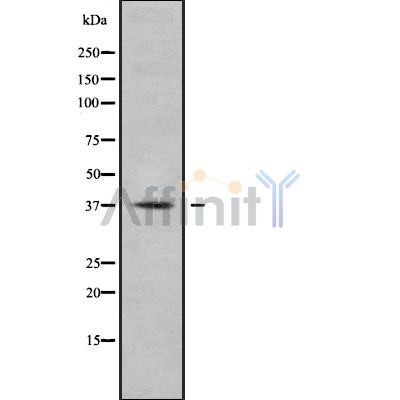AKR1C1 Antibody - #DF9189
| Product: | AKR1C1 Antibody |
| Catalog: | DF9189 |
| Description: | Rabbit polyclonal antibody to AKR1C1 |
| Application: | WB IHC IF/ICC |
| Reactivity: | Human, Monkey |
| Mol.Wt.: | 37 kDa; 37kD(Calculated). |
| Uniprot: | Q04828 |
| RRID: | AB_2842385 |
Product Info
*The optimal dilutions should be determined by the end user. For optimal experimental results, antibody reuse is not recommended.
*Tips:
WB: For western blot detection of denatured protein samples. IHC: For immunohistochemical detection of paraffin sections (IHC-p) or frozen sections (IHC-f) of tissue samples. IF/ICC: For immunofluorescence detection of cell samples. ELISA(peptide): For ELISA detection of antigenic peptide.
Cite Format: Affinity Biosciences Cat# DF9189, RRID:AB_2842385.
Fold/Unfold
2-dihydrobenzene-1; 2-diol dehydrogenase; 20 alpha (3 alpha) hydroxysteroid dehydrogenase; 20 ALPHA HSD; 20 alpha hydroxysteroid dehydrogenase; 20-alpha-HSD; 20-alpha-hydroxysteroid dehydrogenase; 20ALPHAHSD; 2ALPHAHSD; AK1C1; AK1C1_HUMAN; AKR1C1; Aldo keto reductase family 1 member C1; aldo-keto reductase C; Aldo-keto reductase family 1 member C1; Aldo-keto reductase family, 1 member 1; C9; Chlordecone reductase homolog; Chlordecone reductase homolog HAKRC; DD1; DD1/DD2; DDH; DDH1; Dihydrodiol dehydrogenase 1; Dihydrodiol dehydrogenase 1/2; dihydrodiol dehydrogenase 1; 20-alpha (3-alpha)-hydroxysteroid dehydrogenase; dihydrodiol dehydrogenase isoform DD1; Dihydrodiol dehydrogenase, type 1; H37; HAKRC; HBAB; Hepatic dihydrodiol dehydrogenase; High affinity hepatic bile acid-binding protein; High-affinity hepatic bile acid-binding protein; Indanol dehydrogenase; MBAB; MGC8954; Trans-1; Trans-1,2 dihydrobenzene 1,2 diol dehydrogenase; Type II 3 alpha hydroxysteroid dehydrogenase;
Immunogens
A synthesized peptide derived from human AKR1C1, corresponding to a region within the internal amino acids.
Expressed in all tissues tested including liver, prostate, testis, adrenal gland, brain, uterus, mammary gland and keratinocytes. Highest levels found in liver, mammary gland and brain.
- Q04828 AK1C1_HUMAN:
- Protein BLAST With
- NCBI/
- ExPASy/
- Uniprot
MDSKYQCVKLNDGHFMPVLGFGTYAPAEVPKSKALEATKLAIEAGFRHIDSAHLYNNEEQVGLAIRSKIADGSVKREDIFYTSKLWCNSHRPELVRPALERSLKNLQLDYVDLYLIHFPVSVKPGEEVIPKDENGKILFDTVDLCATWEAVEKCKDAGLAKSIGVSNFNRRQLEMILNKPGLKYKPVCNQVECHPYFNQRKLLDFCKSKDIVLVAYSALGSHREEPWVDPNSPVLLEDPVLCALAKKHKRTPALIALRYQLQRGVVVLAKSYNEQRIRQNVQVFEFQLTSEEMKAIDGLNRNVRYLTLDIFAGPPNYPFSDEY
Research Backgrounds
Converts progesterone to its inactive form, 20-alpha-dihydroxyprogesterone (20-alpha-OHP). In the liver and intestine, may have a role in the transport of bile. May have a role in monitoring the intrahepatic bile acid concentration. Has a low bile-binding ability. May play a role in myelin formation.
Cytoplasm.
Expressed in all tissues tested including liver, prostate, testis, adrenal gland, brain, uterus, mammary gland and keratinocytes. Highest levels found in liver, mammary gland and brain.
Belongs to the aldo/keto reductase family.
Research Fields
· Metabolism > Lipid metabolism > Steroid hormone biosynthesis.
· Metabolism > Xenobiotics biodegradation and metabolism > Metabolism of xenobiotics by cytochrome P450.
Restrictive clause
Affinity Biosciences tests all products strictly. Citations are provided as a resource for additional applications that have not been validated by Affinity Biosciences. Please choose the appropriate format for each application and consult Materials and Methods sections for additional details about the use of any product in these publications.
For Research Use Only.
Not for use in diagnostic or therapeutic procedures. Not for resale. Not for distribution without written consent. Affinity Biosciences will not be held responsible for patent infringement or other violations that may occur with the use of our products. Affinity Biosciences, Affinity Biosciences Logo and all other trademarks are the property of Affinity Biosciences LTD.



